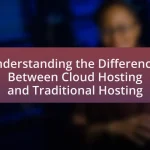A dedicated server is a hosting solution that allocates an entire physical server to a single client, offering exclusive access to its resources. This article explores the significance of dedicated servers for businesses, highlighting their advantages over shared hosting, including enhanced performance, security, and customization. Key features such as scalability, technical specifications, and types of dedicated servers are examined, alongside factors influencing server selection, such as business needs and support options. Additionally, best practices for managing dedicated servers and ensuring optimal performance and security are discussed, providing a comprehensive guide for businesses looking to choose the right dedicated server for their operational requirements.
What is a Dedicated Server and Why is it Important for Businesses?
A dedicated server is a type of hosting service where an entire physical server is allocated to a single client, providing exclusive access to its resources. This exclusivity is crucial for businesses that require high performance, enhanced security, and complete control over their server environment. Dedicated servers are important for businesses because they can handle large volumes of traffic, support resource-intensive applications, and ensure better uptime and reliability compared to shared hosting solutions. According to a study by HostingAdvice, dedicated servers can improve website performance by up to 50% due to their dedicated resources, making them a vital choice for businesses aiming to optimize their online presence and operational efficiency.
How does a dedicated server differ from shared hosting?
A dedicated server provides exclusive resources to a single user or organization, while shared hosting allocates resources among multiple users on the same server. This exclusivity in dedicated servers results in enhanced performance, security, and customization options, as the entire server’s capabilities are available for one entity’s use. In contrast, shared hosting can lead to slower performance and potential security risks due to resource sharing, as one user’s activities can impact others on the same server.
What are the key features of dedicated servers?
Dedicated servers offer several key features that make them suitable for businesses requiring high performance and reliability. Firstly, dedicated servers provide exclusive access to all hardware resources, ensuring optimal performance without competition from other users. This exclusivity allows for enhanced processing power, memory, and storage capacity tailored to specific business needs.
Secondly, dedicated servers offer customizable configurations, enabling businesses to select the operating system, hardware specifications, and software applications that best fit their requirements. This flexibility is crucial for businesses with unique workloads or specific compliance needs.
Thirdly, dedicated servers typically come with robust security features, including firewalls, DDoS protection, and physical security measures, which are essential for safeguarding sensitive data and maintaining compliance with regulations.
Additionally, dedicated servers provide high levels of uptime and reliability, often backed by service level agreements (SLAs) that guarantee performance metrics. This reliability is vital for businesses that depend on consistent online presence and service availability.
Finally, dedicated servers often include dedicated technical support, ensuring that businesses have access to expert assistance for troubleshooting and maintenance, which is critical for minimizing downtime and optimizing server performance.
Why might a business choose a dedicated server over other hosting options?
A business might choose a dedicated server over other hosting options primarily for enhanced performance and control. Dedicated servers provide exclusive resources, which means that businesses can handle higher traffic volumes and run resource-intensive applications without the limitations imposed by shared hosting environments. This exclusivity leads to improved website speed and reliability, essential for maintaining customer satisfaction and operational efficiency. Additionally, dedicated servers offer greater customization and security, allowing businesses to configure their server settings according to specific needs and implement robust security measures to protect sensitive data.
What are the primary benefits of using a dedicated server?
The primary benefits of using a dedicated server include enhanced performance, increased security, and full control over server resources. Dedicated servers provide superior performance because they allocate all resources to a single user, ensuring optimal speed and reliability for applications and websites. Increased security is achieved as dedicated servers are less vulnerable to attacks compared to shared hosting environments, allowing for tailored security measures. Additionally, users have full control over the server configuration, enabling customization to meet specific business needs, which is crucial for scalability and resource management.
How does a dedicated server enhance performance and reliability?
A dedicated server enhances performance and reliability by providing exclusive resources to a single user or organization, eliminating competition for bandwidth and processing power. This exclusivity allows for optimized server configurations tailored to specific applications, resulting in faster load times and improved response rates. Additionally, dedicated servers typically offer higher uptime rates, often exceeding 99.9%, due to their robust hardware and dedicated support, which minimizes downtime and ensures consistent availability. This reliability is crucial for businesses that require uninterrupted access to their services and data.
What security advantages does a dedicated server provide?
A dedicated server provides enhanced security advantages by isolating resources and data from other users. This isolation minimizes the risk of data breaches and unauthorized access, as there are no shared resources that could be exploited by malicious actors. Additionally, dedicated servers allow for customized security configurations, enabling businesses to implement specific firewalls, intrusion detection systems, and security protocols tailored to their unique needs. The dedicated nature of the server also means that software updates and security patches can be applied promptly without the risk of affecting other users, further strengthening the overall security posture.
What Factors Should You Consider When Choosing a Dedicated Server?
When choosing a dedicated server, consider factors such as performance, scalability, security, support, and cost. Performance is crucial as it determines the server’s ability to handle your workload efficiently; for instance, selecting a server with a powerful CPU and sufficient RAM can significantly enhance speed and responsiveness. Scalability is important for future growth; ensure the server can accommodate increased traffic or resource demands without requiring a complete overhaul. Security features, including firewalls and DDoS protection, are essential to safeguard sensitive data. Reliable support from the hosting provider can minimize downtime and resolve issues quickly, while cost must align with your budget without compromising on necessary features. These factors collectively ensure that the dedicated server meets your business needs effectively.
How do your business needs influence your choice of a dedicated server?
Business needs significantly influence the choice of a dedicated server by determining the required specifications, performance, and scalability. For instance, a company with high traffic demands may require a server with robust processing power and increased bandwidth to ensure optimal performance, while a business focused on data security might prioritize dedicated servers with advanced security features and compliance certifications. Additionally, specific applications or workloads, such as database management or web hosting, necessitate tailored configurations, impacting the selection process. According to a study by Gartner, 70% of businesses report that their server choice directly affects operational efficiency, highlighting the importance of aligning server capabilities with business objectives.
What specific applications or workloads will the server support?
The server will support applications such as web hosting, database management, virtualization, and enterprise resource planning (ERP) systems. These workloads require dedicated resources for optimal performance, as they often involve high traffic, large data processing, and complex computations. For instance, web hosting demands reliable uptime and fast response times, while database management benefits from the server’s ability to handle multiple queries simultaneously. Virtualization allows for the efficient use of hardware by running multiple operating systems, and ERP systems require robust processing power to manage business operations effectively.
How does scalability play a role in your decision?
Scalability is crucial in the decision-making process for selecting a dedicated server because it determines the server’s ability to accommodate future growth and increased demand. A scalable server allows businesses to expand their resources, such as CPU, RAM, and storage, without significant downtime or the need for a complete system overhaul. For instance, a study by Gartner indicates that businesses that prioritize scalability in their IT infrastructure can reduce operational costs by up to 30% as they grow. This adaptability ensures that the server can support evolving business needs, making it a key factor in long-term planning and investment.
What technical specifications should you evaluate?
When evaluating technical specifications for a dedicated server, focus on processor type, RAM capacity, storage options, bandwidth, and network connectivity. The processor type, such as Intel Xeon or AMD EPYC, impacts performance and multitasking capabilities. RAM capacity, typically ranging from 8GB to 128GB or more, affects the server’s ability to handle multiple applications simultaneously. Storage options include HDDs and SSDs, with SSDs offering faster data access speeds. Bandwidth determines the amount of data that can be transferred over the network, influencing website performance and user experience. Lastly, network connectivity options, such as Gigabit Ethernet or 10GbE, affect data transfer rates and overall server responsiveness.
How important is CPU performance for your dedicated server?
CPU performance is crucial for a dedicated server as it directly impacts processing speed, multitasking capabilities, and overall system efficiency. A powerful CPU enables faster data processing, which is essential for applications requiring high computational power, such as databases, web hosting, and virtualization. For instance, servers equipped with multi-core processors can handle multiple simultaneous tasks more effectively, leading to improved performance and user experience. Additionally, benchmarks indicate that servers with higher CPU performance can reduce latency and increase throughput, making them more suitable for demanding workloads.
What role does RAM size play in server performance?
RAM size significantly impacts server performance by determining the amount of data that can be processed simultaneously. Larger RAM allows for more applications and processes to run concurrently without slowing down the server, which is crucial for handling high traffic and complex tasks. For instance, servers with 32GB of RAM can manage multiple virtual machines and databases more efficiently than those with only 8GB, leading to faster response times and improved user experience. Studies show that increasing RAM can reduce latency and enhance throughput, making it a critical factor in optimizing server performance for business needs.
Why is storage type and capacity crucial for your business needs?
Storage type and capacity are crucial for business needs because they directly impact data management, performance, and scalability. The right storage type, whether SSD or HDD, influences speed and reliability; for instance, SSDs offer faster data access and lower latency compared to traditional HDDs. Additionally, adequate storage capacity ensures that a business can handle current data requirements while allowing for future growth. According to a study by IDC, organizations that optimize their storage solutions can improve operational efficiency by up to 30%. Thus, selecting the appropriate storage type and capacity is essential for maintaining optimal performance and supporting business expansion.
What Types of Dedicated Servers Are Available?
There are several types of dedicated servers available, including managed dedicated servers, unmanaged dedicated servers, cloud dedicated servers, and hybrid dedicated servers. Managed dedicated servers provide full support and maintenance from the hosting provider, allowing businesses to focus on their operations without worrying about server management. Unmanaged dedicated servers offer complete control to the user, requiring them to handle all aspects of server management, which is suitable for those with technical expertise. Cloud dedicated servers combine the benefits of dedicated hardware with cloud technology, offering scalability and flexibility. Hybrid dedicated servers integrate both dedicated and cloud resources, allowing businesses to optimize performance and cost. Each type serves different business needs based on technical requirements and management preferences.
What are the differences between managed and unmanaged dedicated servers?
Managed dedicated servers provide comprehensive support and maintenance from the hosting provider, while unmanaged dedicated servers require the user to handle all server management tasks independently. In managed services, the provider typically offers services such as software updates, security monitoring, and technical support, ensuring that the server operates efficiently and securely. In contrast, unmanaged servers give users full control over the server environment, which includes configuring, maintaining, and troubleshooting the server without assistance from the provider. This distinction is crucial for businesses; those lacking technical expertise may prefer managed servers for their convenience, while technically proficient users might opt for unmanaged servers to maximize control and customization.
What level of control do you need over your server?
The level of control needed over a server typically depends on the specific requirements of the business and its operational needs. Businesses that require full customization, security, and management capabilities generally opt for dedicated servers, which provide complete administrative access and control over the server environment. This level of control allows for tailored configurations, installation of specific software, and the ability to implement security measures that align with the organization’s policies. For instance, according to a report by Statista, 60% of businesses prefer dedicated servers for their enhanced control and performance, highlighting the importance of this factor in server selection.
How does support differ between managed and unmanaged options?
Support for managed options includes comprehensive assistance from service providers, covering server management, maintenance, and troubleshooting, while unmanaged options require users to handle all technical aspects independently. Managed services typically offer 24/7 support, proactive monitoring, and regular updates, ensuring optimal performance and security. In contrast, unmanaged services provide minimal support, often limited to basic technical assistance, leaving users responsible for configuration, management, and problem resolution. This distinction is crucial for businesses when selecting a dedicated server, as it directly impacts operational efficiency and resource allocation.
What are the various configurations of dedicated servers?
Dedicated servers can be configured in various ways to meet specific business needs. Common configurations include single processor servers, which are suitable for basic applications; dual processor servers, which provide enhanced performance for more demanding tasks; and multi-core servers, designed for high-performance computing and virtualization. Additionally, dedicated servers can be customized with different amounts of RAM, storage options (HDD or SSD), and network capabilities, allowing businesses to tailor their server to their workload requirements. These configurations ensure that dedicated servers can efficiently handle varying levels of traffic and application demands.
How do standard dedicated servers compare to high-performance servers?
Standard dedicated servers typically offer basic performance and resources suitable for general hosting needs, while high-performance servers are designed for demanding applications requiring superior processing power, memory, and storage capabilities. High-performance servers often utilize advanced hardware components, such as multi-core processors and SSDs, enabling them to handle intensive workloads and provide faster data access. In contrast, standard dedicated servers may have limited scalability and may not support high levels of concurrent users or complex applications effectively. This distinction is crucial for businesses that need to assess their specific performance requirements when choosing a dedicated server solution.
What are the benefits of choosing a cloud-based dedicated server?
Choosing a cloud-based dedicated server offers scalability, flexibility, and enhanced performance. Scalability allows businesses to easily adjust resources based on demand, ensuring optimal performance during peak times without over-provisioning. Flexibility is evident in the ability to customize server configurations to meet specific business needs, which can lead to improved operational efficiency. Enhanced performance is achieved through high availability and redundancy, minimizing downtime and ensuring that applications run smoothly. According to a report by Gartner, organizations that adopt cloud solutions can reduce IT costs by up to 30%, further validating the financial benefits of cloud-based dedicated servers.
How can you ensure you are getting the best value for your dedicated server?
To ensure you are getting the best value for your dedicated server, compare pricing and features across multiple providers. Evaluating the specifications such as CPU power, RAM, storage options, and bandwidth limits allows you to identify which server meets your needs at a competitive price. Additionally, consider the level of customer support, uptime guarantees, and scalability options offered by the provider, as these factors significantly impact overall value. Research shows that businesses that assess these criteria can save up to 30% on hosting costs while improving performance and reliability.
What should you look for in terms of pricing and contracts?
When evaluating pricing and contracts for dedicated servers, focus on total cost of ownership, including setup fees, monthly rates, and potential overage charges. It is essential to compare the pricing structures of different providers, as some may offer lower initial costs but higher long-term expenses due to hidden fees or limited resources. Additionally, examine the contract terms for flexibility, such as the duration of the agreement, cancellation policies, and upgrade options, which can impact your ability to adapt to changing business needs. Understanding these elements ensures that you select a dedicated server solution that aligns with your budget and operational requirements.
How can you assess the reputation of a dedicated server provider?
To assess the reputation of a dedicated server provider, examine customer reviews and ratings across multiple platforms. Analyzing feedback on websites like Trustpilot, G2, or Reddit can provide insights into user experiences and satisfaction levels. Additionally, consider the provider’s history, including how long they have been in business and any awards or recognitions they have received, which can indicate reliability and trustworthiness. Furthermore, check for uptime guarantees and customer support responsiveness, as these factors are critical in evaluating the overall service quality.
What are some best practices for managing your dedicated server?
To effectively manage a dedicated server, implement regular software updates and security patches. Keeping the server’s operating system and applications up to date minimizes vulnerabilities and enhances performance. According to a report by the Ponemon Institute, 60% of data breaches are linked to unpatched vulnerabilities, highlighting the importance of timely updates. Additionally, establish a robust backup strategy to ensure data integrity and availability; regular backups can prevent data loss in case of hardware failure or cyberattacks. Monitoring server performance and resource usage is also crucial; tools like Nagios or Zabbix can provide real-time insights, allowing for proactive management of server resources. Finally, configure firewalls and security protocols to protect against unauthorized access, as 90% of successful cyberattacks exploit known vulnerabilities, underscoring the need for stringent security measures.
How can regular maintenance improve server performance?
Regular maintenance significantly improves server performance by ensuring optimal operation and preventing issues that can lead to downtime. Scheduled tasks such as software updates, hardware checks, and system cleanups help maintain system efficiency and security. For instance, a study by the International Journal of Computer Applications found that regular updates can reduce vulnerabilities by up to 80%, thereby enhancing overall server reliability. Additionally, monitoring system performance metrics allows for early detection of potential problems, which can be addressed before they escalate, further ensuring consistent performance.
What security measures should you implement for your dedicated server?
To secure your dedicated server, implement measures such as firewalls, regular software updates, strong password policies, and intrusion detection systems. Firewalls act as barriers between your server and potential threats, controlling incoming and outgoing traffic. Regular software updates patch vulnerabilities, reducing the risk of exploitation. Strong password policies, including complexity and regular changes, help prevent unauthorized access. Intrusion detection systems monitor for suspicious activity, providing alerts for potential breaches. These measures collectively enhance the security posture of your dedicated server, protecting sensitive data and maintaining system integrity.










